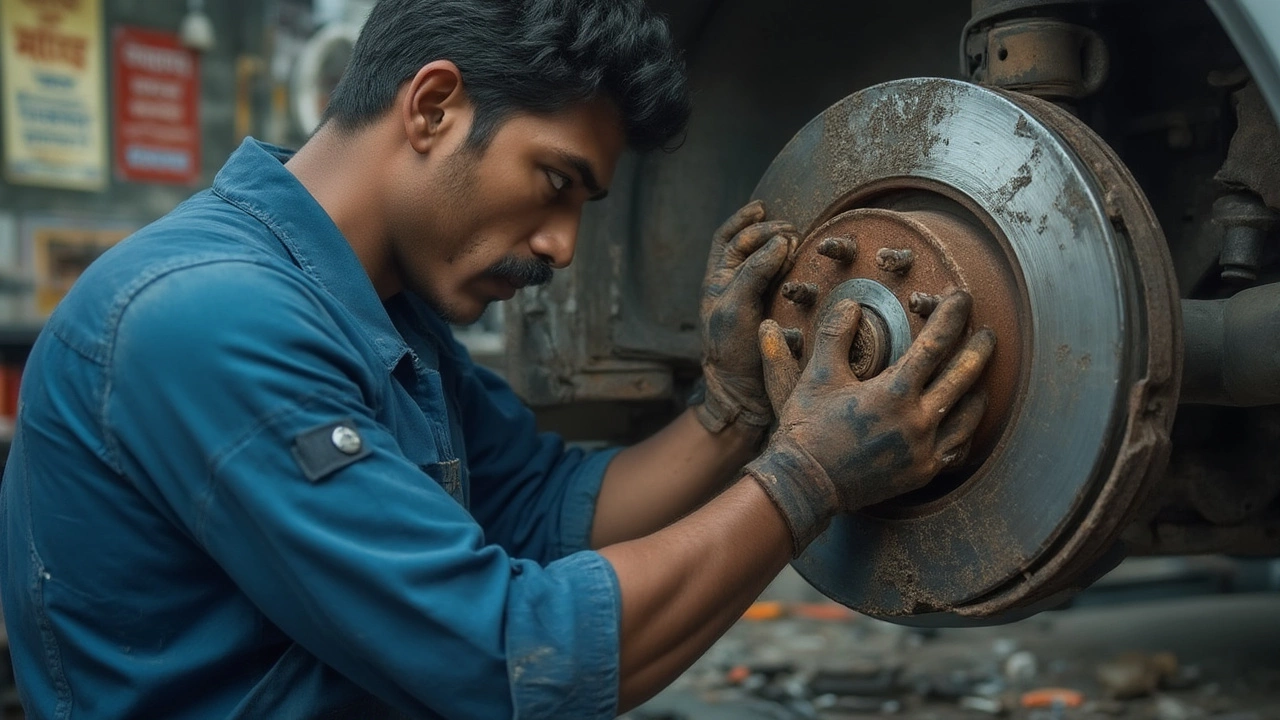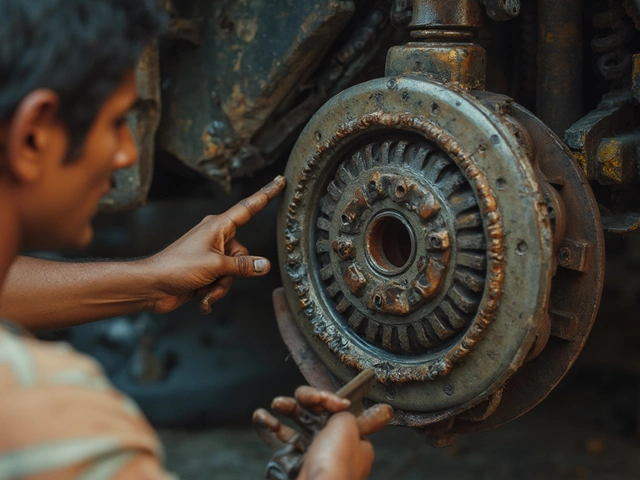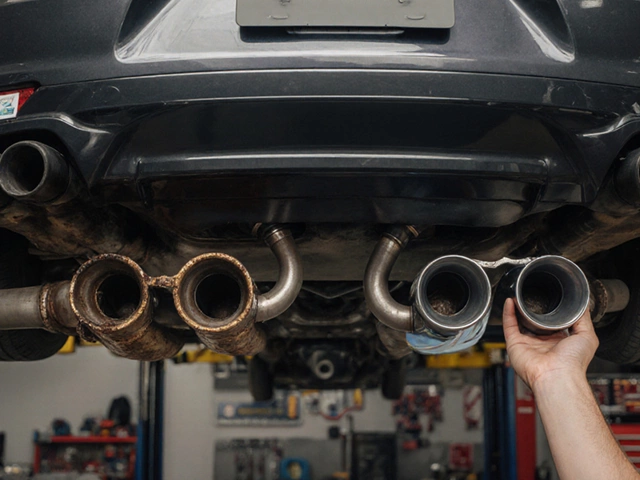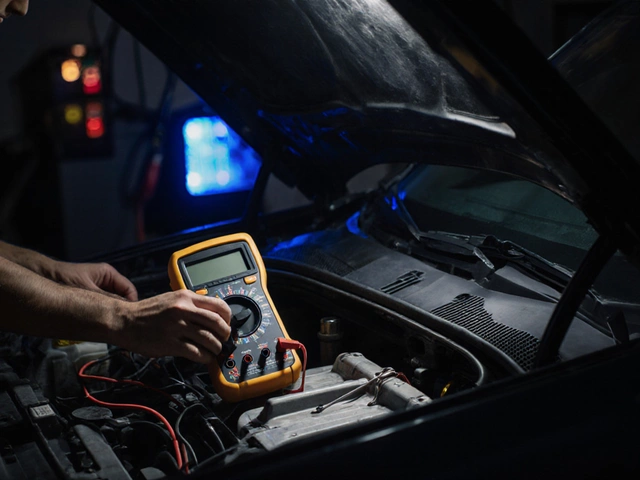If you’ve ever mashed the brakes and heard a sharp grinding, you probably felt your heart skip a beat. That sound is like your car’s version of screaming, “Help!” Most folks ignore it, hoping it’ll go away, but that choice could bite you hard. When brakes grind, it’s more than just an annoyance; there’s real danger sitting right there under your foot. Let’s pull back the curtain and get into what grinding brakes are really telling you, why every mile you drive on them is a gamble, and what you absolutely need to know before you cruise another block hoping it’ll be fine.
Why Are Your Brakes Grinding?
Grinding brakes don’t start as a random car quirk. That awful noise you’re hearing is metal scraping against metal, and things don’t get friendlier from there. Usually, it means your brake pads are worn right down to their last breath—no longer cushioned by friction material. In a lot of daily drivers, pads should last anywhere from 25,000 to 65,000 miles, depending on how hard you stomp and what kind of driving you’re doing. If you hear a grind, it typically means that protective layer is gone. The backing plate, which is just metal, is now pressing directly onto your brake rotor. If this is happening, your car is shredding expensive parts every time you press the pedal.
But it’s not always just worn pads. Sometimes debris gets lodged between the pad and rotor, especially if you’ve been off-roading or driving through muddy or sandy areas. Sometimes you might have uneven brake wear because a caliper gets stuck, which means you’ll see one wheel’s pads bald while the others look just fine. Sometimes shims that are supposed to cushion and reduce noise loosen up or get damaged, causing that metallic grind. Each culprit comes with costs and risks—but worn-down pads remain the most common suspect.
If you want to check what’s happening without crawling under your car, listen closely. Usually, squealing is an early warning—most pads are designed with a small metal indicator that makes a high-pitched squeal when pads are running low. Ignore that, and the next stop is grinding. If you feel vibrations through the pedal, it means the rotor’s probably warped or damaged as well, and you’re headed for an even bigger bill. The National Highway Traffic Safety Administration (NHTSA) says that faulty brakes cause tens of thousands of accidents each year. You don’t want your car joining that statistic.
The type of noise also hints at the problem: constant grinding that gets louder as you stop is a big red flag. Brakes should never make noise unless you’re hitting the end of their service life or something’s actually broken. If there’s a single grind after backing out of your driveway but silence after, it might just be surface rust. But if every stop squeals, scrapes, or grinds, it’s time to pay attention. Unless you’re a gambler at heart or have a spare car sitting around, it’s not a risk worth taking.
Real Dangers of Driving with Grinding Brakes
Here’s the blunt truth: you’re asking for trouble if you keep driving with grinding brakes. The sound itself is a warning, but the damage happens out of sight, right at your wheels. With every mile, you’re turning what might’ve been a simple pad swap into full-blown rotor and caliper replacements—easy $1,000 territory at any shop, even more for certain imported cars. But forget the money for a second. The real problem is what happens when those braking parts finally give up. If pads are gone, your braking force drops like a rock. Your stopping distance shoots up; instead of coming to a halt in time for that red light or a kid chasing a basketball, your car just keeps going. Even a split-second delay can mean the difference between a scare and a disaster.
If the rotor gets too thin from metal-on-metal scraping, it can start to crack or even shatter. There have been real-deal cases where rotors just broke off, leaving drivers with no brakes at all. Ever heard of boiling brake fluid? That can start happening because busted pads and rotors cause way more heat. When brake fluid boils, you lose hydraulic pressure. So you press a brake pedal that suddenly feels spongy—or worse, goes all the way to the floor. And at that point, the only thing stopping your car is whatever’s in your way.
One more overlooked danger: your brake system is all connected. Damage to the pads and rotors sends vibrations and extra stress to calipers, ABS sensors, even the wheel bearings. Small parts that weren’t supposed to handle metal-grinding stress start failing too. Per the AAA Foundation for Traffic Safety, cars with compromised brakes are up to four times more likely to be involved in at-fault accidents. But even if you get lucky and don’t slam into anything, those neglected brakes will easily cost five times more in repairs than just swapping the pads.
Take a look at real-world numbers. Here’s an average cost breakdown (U.S. dollars, 2025):
| Repair Needed | Estimated Cost |
|---|---|
| Brake Pad Replacement | $150-$300 (per axle) |
| Rotor Resurfacing/Replacement | $300-$600 (per axle) |
| Caliper Replacement | $200-$500 each |
| Wheel Bearing Replacement | $350-$600 each |
So, what starts as a $200 pad swap can snowball into more than $1,500 for full repairs. That’s not even counting towing, emergency service, or higher insurance if you do end up in a crash. It’s not just about money, though—brake failure on the road is statistically one of the top five mechanical reasons for car accidents in North America. Don’t let your ride become a rolling hazard.

What You Should Do When You Hear Grinding Noises
When your car’s brakes start grinding, it’s not time to wait and see if it magically fixes itself. Act now to avoid bigger headaches later. If you hear metal-on-metal noise, the first thing is to stop driving unless absolutely necessary. If you’re stuck somewhere and can’t get a tow right away, drive only as short a distance as you must, and keep speeds low to minimize the load on damaged parts. Don’t ignore the noise or try to drown it out with music—your car is communicating in plain language.
Next, check your owner’s manual—some cars have brake pad wear indicators, and knowing how those work can give you key clues about what needs repair. Look for warning lights on your dashboard. Modern cars with electronic brakes often throw up alerts for low brake pads or worn rotors. If you can, peek through your wheel spokes—sometimes you’ll spot a rotor covered in rough grooves or an obviously thin pad. But most issues need a shop for a real diagnosis.
Bring your car to a trusted mechanic or dealership as soon as possible. Ask for a thorough brake inspection—not just pads, but also rotors, calipers, and brake lines. Sometimes the grind comes from something as simple as a stuck rock, but almost always, worn pads are to blame. If you do need repairs, don’t just replace the pads—ask whether the rotors are still thick enough. Shops use a micrometer to measure rotor thickness; if below spec, they replace them. Skimp on this, and you’ll be back with grinding noises in a couple of weeks.
Set a reminder in your phone or on your dashboard for future pad checks. Most mechanics recommend looking at your brakes every 10,000 miles, and definitely every time you rotate your tires. If you haul heavy loads, drive in the mountains, or spend hours slogging through stop-and-go traffic, check more often. The harder your brakes work, the faster they’ll wear out.
- Listen for early warning sounds—squeals mean it’s almost time, grinding means you’re out of time.
- Never rely on braking with only one axle (front or rear). Replace both sides, even if only one is noisy.
- If you notice the car pulling to one side, mushy pedal feel, or a burning smell, those are all signs of brake trouble that you shouldn’t ignore.
- Brake jobs today do not require fancy dealerships or exotic tools. Trusted independents can do the job just as well for less. But make sure whoever does it uses quality parts—cheaping out on brakes is like gambling with your safety.
The bottom line—don’t wait until that grind becomes a crunch, or even worse, a silence that means nothing’s left to stop you. Addressing those sounds fast can save your money and probably your skin, too.
How to Keep Your Brakes Quiet and Reliable
Nobody likes surprise car repairs, especially when the warning signs were literally screaming the whole time. The absolute best defense against brake failure is a solid routine for checking and caring for your braking system. Every few thousand miles, sneak a quick peek through your wheels (or ask during an oil change). Look for thick pads, clean rotors, and no big grooves or trails of fine rust. Some shops even offer free brake inspections when you get your tires rotated—take them up on it.
If you live in a place with salty winter roads, have your brakes cleaned after the season’s done. Corrosion eats away at pads, rotors, and little hardware clips. If you start to hear squealing when you first start the car but it goes away after several stops, you might just have some overnight rust, which is normal. Constant noise, though, means real trouble.
Pay attention to how your car feels when stopping. A firm, responsive pedal is the goal. If it starts getting mushy or you have to push farther to stop, have the fluid checked and look for leaks. If your steering wheel shakes hard when braking, that’s a sign of warped rotors, another sign it’s time for a shop visit. Don’t wait for a brake warning light—sometimes they don’t activate until real damage is done.
Here’s an easy checklist to remember:
- Check brakes with every tire rotation, usually every 5,000 to 7,500 miles
- Replace pads when there’s 3mm or less of friction material
- Flush brake fluid every 2 years or as the manufacturer recommends
- Use your senses—listen for noise, feel for pedal changes, look for leaks
- Trust your instincts—if something feels wrong, get it checked
If you catch wear early, it’s a quick, cheap fix. Wait too long, and not only does the repair skyrocket, but you risk your safety. Remember, your brakes are the single most important safety system on your car, hands down. Grinding brakes aren’t just about noise—they’re a bad-news sign you can’t afford to ignore.




